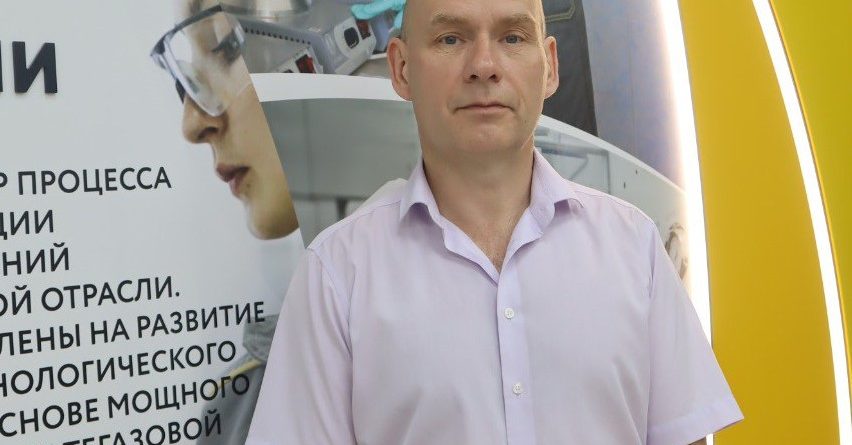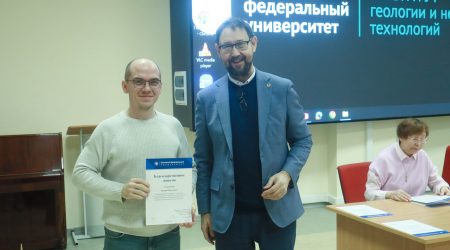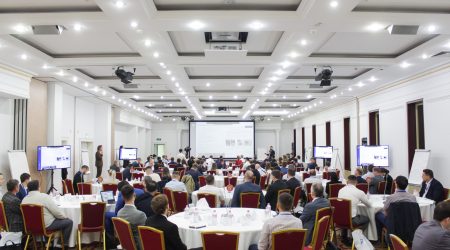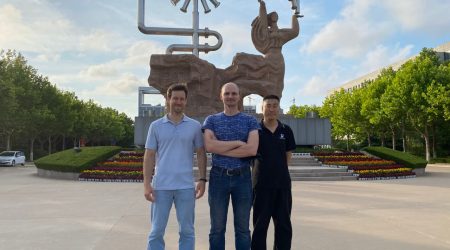Director Vladimir Silantyev: “If there was time travel, I would only travel to the future”
Director of the Institute of Geology and Petroleum Technologies gave an interview to the KFU Media Communications Center before the new academic year.
Vladimir Vladimirovich, many boys are interested in dinosaurs. Did your love for geology and paleontology also begin with them?
V.S.: I was not interested in dinosaurs as a child. My love for geology was formed gradually. It all started with traveling around the Soviet Union. In my childhood I visited many regions, including Belarus, Ukraine, and Moldova. I became interested in rocks and minerals.
When was your first acquaintance with Kazan University and what was it like?
V.S.: My mother Zinaida Ivanovna Makarova was a specialist in paleobotany and worked as a teacher at the Botany Department of Kazan University. When I was in elementary school, there was no after-school care program. My mother would pick me up from school – it was not far from our university – and bring me to work. I did my homework in the winter garden, which was then turned into a laboratory room of the Botany Department. That was my first acquaintance with Kazan University.
Is anyone else in your family connected with Kazan University?
V.S.: Yes, my father graduated from the Faculty of Geology in 1952. He worked in the Far East, in Leningrad, in Kazan – at the Institute of Geology of Non-Metallic Raw Materials, and also abroad – in Algeria, Cuba, and Yemen.
My grandfather Nikita Andrianovich Silantyev started working at Kazan University 90 years ago, in 1934. He was a carpenter and head housekeeper of the suburban astronomical observatory. Some of the oak bookcases that have survived in the observatory were made by him. He was a communist, a member of the All-Union Communist Party of Bolsheviks, and together with the director of the observatory (and then rector of Kazan University) Dmitrii Yakovlevich Martynov was a member of the party cell of the observatory, consisting of the two of them. During the Great Patriotic War, the party cell organized a joint vegetable garden of the observatory staff in order to combine the harvest of shady and sunny plots and share it equally among all. This allowed to avoid hunger and preserve the team. In summer, guests came to the observatory – Academician of the USSR Academy of Sciences, future Nobel laureate Pyotr Kapitsa and future Academician of the Soviet Academy of Sciences Yevgenii Konstantinovich Zavoyskii. They tried to go fishing on the Volga River with their grandfather, but the riverside mosquitoes prevailed, and they did not become fishermen.
You studied at Kazan University in the 80s. What global changes have taken place in geological education since then?
V.S.: Geological education in the 1980s was provincial, now it has reached the international level, it has become diversified. Now we have a modern laboratory infrastructure, which we managed to create with the support of federal programs.
KFU has been in the top 40 QS World University Rankings for several years. This year it ranked 38th in the world and 2nd in Russia in this ranking. What is the secret of success?
V.S.: IGPT is known all over the world, firstly, thanks to the Kazan Geological School, and, secondly, thanks to the creation of new technologies of thermal methods of oil recovery enhancement, development of catalysts for underground oil refining of high-viscosity and extra-viscous oil.
Kazan Federal University is a head organization in the World-Class Research Center for Liquid Hydrocarbons. This Center performs developments related to oil recovery enhancement and field forecasting not only for major Russian companies such as Gazprom, Rosneft, Gazpromneft, Lukoil, Tatneft, but also for companies from China, Latin America, Middle East, India, Vietnam, abd Malaysia. I would like to note that often the developments of our scientists do not just replace Western technologies, they have no analogues in the world, it is not so much about substitution as about technological leadership.
Is it true that your students are picked up by employers even before they graduate? What unusual places on the globe do your graduates work in? And, by the way, what was the average Unified State Exam score of those who entered?
V.S.: The average USE score was 72 points. And, indeed, all our graduates are in demand. We create conditions for their employment by actively cooperating with industrial partners. In particular, we have opened a Digital Twin Laboratory in cooperation with Gazpromneft, where our students work, performing real production tasks. Upon graduation, they successfully move on to work for this company, as they are already integrated into its core business processes.
Our graduates work not only in the CIS countries, but also all over the world, for example, in the United Arab Emirates, Iraq, Syria, North Africa, Venezuela, Peru, Indonesia, Norway, Spain, Germany, Canada, and Cuba.
You have recently become the Institute Director. And you’ve been heading the Shtukenberg Geological Museum for many years. Can you name some of the more curious exhibits?
V.S.: The rarest are meteorites; the most beautiful are corals and shells from the southern seas brought by the future rector Ivan Simonov after the discovery of the Antarctic; the most unusual are the skulls of woolly rhinoceroses and mammoths.
Do you collect anything?
V.S.: I have no collections. But there is a white retriever – my companion in many cases. The dog, like me, is a traveler. We flew with her to Uzbekistan, she took part in studying the geological training ground, then returned to Russia by car, and on the way she got acquainted with camels and horses of Kazakhstan.
Quick questions
- What would you like to wish Kazan University in the year of its 220th anniversary?
Youth, and not to be afraid of new challenges of time.
- Did your parents influence your choice of profession?
Indirectly. They loved nature, and thanks to them I grew to love it too.
- What would you like to tell the young women who are going to apply to the Institute?
Geology is more and more becoming a women’s profession, so watch out for the competition!
- If you had an opportunity to travel back in time, where would you go?
I would not go anywhere. Only to the future.
- What does Kazan University mean to you?
It is my life!








